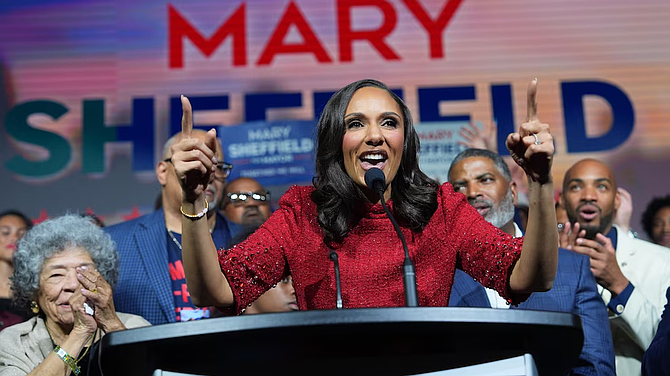Detroit Makes History: Mary Sheffield’s Election Expands the Legacy of Black Women Mayors
Detroit Makes History: Mary Sheffield’s Election Expands the Legacy of Black Women Mayors
Black women are transforming city leadership, breaking barriers, and redefining executive power across urban America
By Glynda C. Carr
Election Night 2025 didn’t just make headlines; it made history. In Detroit, voters shattered a 324-year barrier by electing Mary Sheffield as the city’s first woman and Black woman mayor. Her victory is more than symbolic; it’s a testament to the transformative power of Black women’s leadership and a powerful addition to the growing sisterhood of Black women mayors who are redefining what executive power looks like in America’s cities.
At 38 years old, Mary Sheffield’s rise reflects both vision and grit. The daughter of longtime Detroit community leader Rev. Horace Sheffield, she has spent her career fighting for economic justice, equitable development, and opportunity for all. She was elected to the City Council in 2013, becoming the youngest Detroit council member in the cities history.
In 2022, the members of the city council elected her to serve as Council President where she earned a reputation for bringing people together, pushing for affordable housing, youth employment, and policies that put people, not corporations, at the center of progress. Her leadership has always been rooted in love for her city and an unwavering belief that Detroit’s comeback must include everyone.
Now, as Mayor-elect, Sheffield joins a powerful lineage of Black women leading major cities from Karen Bass in Los Angeles and Muriel Bowser in Washington, D.C., to Cherelle Parker in Philadelphia, Pamela Goynes Brown in North Las Vegas, and Vi Lyles, who was reelected as well to an unprecedented fifth term in Charlotte, North Carolina.
Together, these women represent a bright spot in our democracy and a model for the kind of leadership our nation desperately needs, experienced, empathetic, accountable, and focused on building stronger, safer, more equitable communities from the ground up.
And they are doing so while standing on the frontlines of crisis.
Across the country, Black women mayors are grappling with the real consequences of Washington gridlock, a federal government shutdown that has stretched into its second month, disrupting vital services; the loss of SNAP benefits that threatens the stability of millions of families; and the ongoing challenges of federal ICE enforcement in their communities. While others debate, these women are delivering, ensuring their residents are fed, housed, and safe. They are governing in real time with limited resources and limitless resolve.
When Higher Heights Leadership Fund released our first Black Women in American Politics report in 2014 along with our research partner, The Center for American Women in Politics, just one Black woman served as mayor of one of the nation’s 100 largest cities. Today, that number has grown to eight, matching our share of the U.S. population. In the last decade, 18 Black women have served as big-city mayors, including the first to lead cities like Baton Rouge, Boston, Chicago, and San Francisco.
This is more than a statistic; it’s a sign of transformation. Black women are not only showing up to vote, we’re showing up to govern.
These leaders are guiding America’s largest, most complex cities through some of the most politically toxic and racially divisive times, and they’re doing it with grace, innovation, and a deep commitment to equity. From tackling homelessness and housing affordability to rebuilding public trust and defending democracy itself, they are proving that when Black women lead and show up as their full selves, we all move forward.
But electing them is only the beginning. We must be governing partners by creating the environment for them to lead boldly, amplifying their successes, defending them against unjust attacks, and ensuring they have the tools, resources, and respect they need to lead effectively.
As the Black Women in American Politics report underscores, representation at the executive level matters. It changes how policy is shaped, how communities are served, and how democracy feels to those who’ve too often been left out.
Sheffield’s election is a powerful reminder that when Black women lead, communities thrive. Detroit is now at the forefront of a story of continued renewal, powered by a young, visionary Black woman mayor who believes in the power of collective progress.
Her victory lights the path forward, reminding us that even in times of division and doubt, Black women remain democracy’s strongest defender and brightest hope.
Glynda C. Carr is President & CEO of Higher Heights for America, a 501(c)(4) organization, and its sister organization, Higher Heights Leadership Fund, works to expand Black women’s elected representation and voting participation. Learn more at https://www.higherheightsforamerica.org.
Latest Stories
- Illinois EPA Announces $1.5 Million in Funding Available for Energy Efficiency Upgrades at Public Water Supply Facilities
- As We Prepare to Lay Rev. Jackson to Rest, I’m Thinking About Words That Build Coalitions
- SOUTH CHICAGO RESIDENTS LAUNCH “SOUTHEAST NEIGHBORS FOR QUANTUM” IN SUPPORT OF HISTORIC ILLINOIS QUANTUM AND MICROELECTRONICS PARK DEVELOPMENT
- The Kids Are Alright: High School Sites Outpace Weeklong Early Voting In One Day
- WDB L.E.G.A.C.Y. Weekend Celebrates 20 Years of Empowering Black-Owned Businesses
Latest Podcast
MEDICAL POWER OF ATTORNEY

